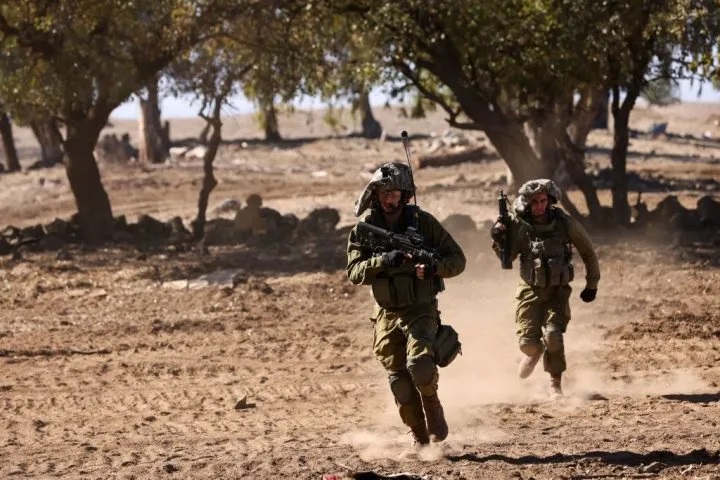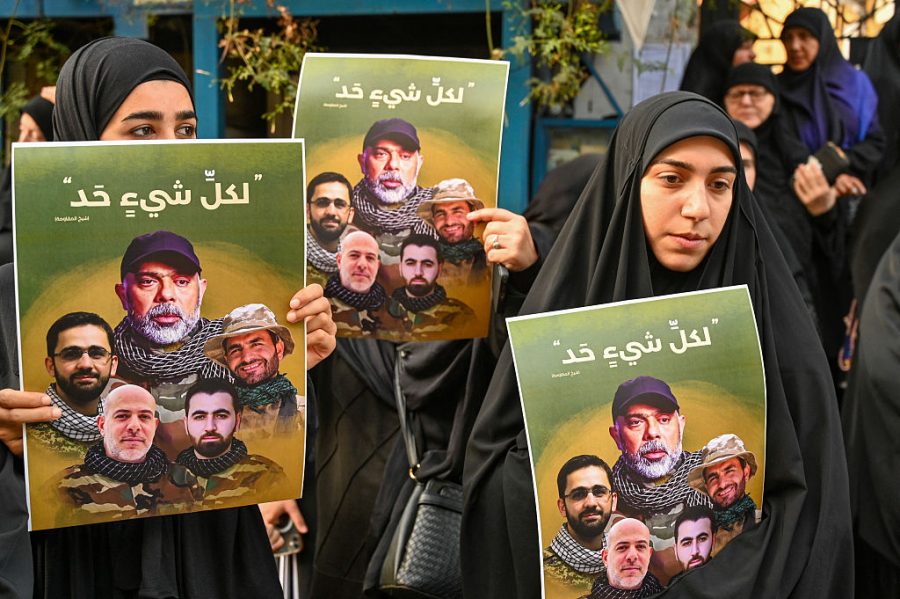From the very beginning, the war between Israel and Hamas has not been confined to just one front. The Iran-backed, Lebanon-based Islamist militant organization Hezbollah started attacking Israel on October 8 — one day after Hamas’s deadly assault. In the weeks since, Iranian militias in Syria and Houthi rebels in Yemen have attacked Israel with missiles and drones, while Iranian-backed forces in Iraq have targeted American troops. For now, Gaza is at the heart of the war — but this may soon change.
Israel has been fighting Hezbollah since the First Lebanon War ended in 1985. During the 15 years the Israeli Defense Forces (IDF) controlled the “security zone,” extending twenty-five miles deep into Lebanon from the border between the two countries to the Litani River, Israeli and Hezbollah forces clashed regularly.
Hezbollah is under pressure from Hamas to increase the intensity of its attacks
Even as a relatively small group with limited power, Hezbollah posed a challenge for the IDF. The Israeli presence in southern Lebanon made it possible to keep Hezbollah away from the border and limit its ability to arm. The organization would occasionally fire short-range, low-precision rockets into Israel that were more disruptive than deadly.
However, the IDF was unsuccessful in deterring Hezbollah, and as casualties among troops mounted, the Israeli public and leadership grew weary of confronting the group from within Lebanon. Troops eventually withdrew — hastily — in May 2000. The Second Lebanon War, fought between July and August 2006, ended in a frustrating tie for Israel, a high death toll and limited achievements.
Following Israel’s withdrawal from Lebanon in 2000, Hezbollah dramatically increased its offensive capabilities. According to some counts, it now has an estimated arsenal of 200,000 rockets and missiles, many of which are guided, high-precision and long-range. These include anti-tank, anti-aircraft and anti-ship missiles. Most of the weapons are Iranian, Russian and Chinese.
They also have an estimated 25,000 fighters, many of whom have fought in the Syrian Civil War, making them highly experienced. Hezbollah gets its funding from Iran and from the highly lucrative drug trade that extends from South America to the Middle East.
Hezbollah is significantly more powerful than Hamas. When war broke out on October 7, Israel evacuated civilians from towns near the border with Lebanon and built up substantial forces along the border. Its main concern was that Hezbollah would emulate Hamas’s attack. The thought of another atrocity where civilians, including children and babies, were raped, beheaded, mutilated, tortured and burnt alive, and many additionally kidnapped, was unbearable. Evacuated Israelis have said that as long as the threat from Hezbollah persists, they would not return to their homes.
Hezbollah is now considered to be an unacceptable risk by Israel. Backed up by senior military commanders, the Israeli Defense Minister Yoav Gallant reportedly was in favor of a preemptive strike against Hezbollah. He was forced to back down after strong objection from the Americans.
Washington’s concern is that a war against Hezbollah would spill over to the rest of the Middle East and involve Iran, Syria, as well as forces in Iraq and Yemen. Their fear is that this could force the US into the war. Russia has been nurturing its relations with Hamas and Iran and it’s not beyond the realms of possibility that it could also get involved — albeit indirectly, because most of Moscow’s resources are tied up in the Ukraine War.
There is a strategic divergence between Israel and the US regarding Hezbollah: the US views the war from a regional and global perspective, but Israel’s concern is with the immediate threat. This threat is so great that Israel may decide to escalate military action against Hezbollah despite American objection. Hezbollah’s persistent attacks since October 8, as well as its violation of the UN Security Council’s resolution stipulating that Hezbollah forces are not allowed to be present south of the Litani River, could serve as a justification.
Hezbollah’s leader, Hassan Nasrallah, is simultaneously under pressure from Hamas to increase the intensity of its attacks, and from Lebanon not to involve the country in war, especially while it endures intense political and economic crisis.
If war breaks out, it will happen soon, within a short timeframe of possibly months
As a result, Hezbollah occasionally increases the intensity of its attacks, as it did last Saturday, when twenty-one Israelis were injured and one was killed in two separate strikes involving rockets and an anti-tank missile. However, the attacks are currently limited and measured — and elicit similar reactions from Israel. Clashes between the sides occur daily; Nasrallah may still believe that a full war is avoidable so is careful not to cross a line that will drag Hezbollah into war, but it’s a risky game.
Nasrallah used to consider Israeli society as weak as a “spider web,” due to its sensitivity to troop casualties that led to the withdrawal from Lebanon. Hamas’s brutal attack has changed things.
Nasrallah now sees a nation willing, at least for now, to accept casualties in return for safety. The Israeli public is resilient, resolved, angry and afraid. Israel has to re-establish deterrence; it reacted aggressively in Gaza, and it would do the same in Beirut if it had to.
By engaging in a war against Israel, Hezbollah would risk losing not only the considerable force it has established, but also its political stronghold within the Lebanese government. Iran has, so far, been deterred from getting involved in the conflict by the build-up of American forces in the region and by Israel’s capabilities. It too does not seek war — a position reiterated this week by Iran’s Supreme Leader Ayatollah Ali Khamenei. It is unlikely that Hezbollah’s attacks on Israel will escalate, even as Hamas struggles.
Gallant said at a press conference last Saturday that “our pilots are in their cockpits, facing north.” If war breaks out, it will happen soon, within a short timeframe of possibly months.
Israel would rather not fight two fronts simultaneously, so it may wait until things settle in Gaza if it decides to preemptively attack Hezbollah. The conditions for it are right: the IDF has recruited reserve forces and they are prepared for war. Tens of thousands of civilians have been evacuated and there are substantial American forces in the region, who, despite being reluctant to actively get involved in the war, are ready for action if necessary.
Although the challenge to Israel is significant, Hezbollah’s strength does not measure up to the IDF’s size and capabilities. To limit deadly missile strikes on Israeli civilians, the IDF will have to strike strategic targets fast and hard. It will also have to push Hezbollah away from the border to prevent infiltrations. Hezbollah’s quarters in the Dahieh suburb of Beirut would be heavily bombarded, and civilians are already leaving the area.
Israelis refer to Lebanon as “the swamp,” where one gets stuck in without much ability to maneuver. In wanting to avoid wars in Lebanon, successive Israeli governments, most of which were led by the war-weary Benjamin Netanyahu, allowed Hezbollah to become a formidable enemy right on their border. After the massacre of October 7, that threat can no longer be contained. Unless the American administration does something dramatic to restrain Israel, there is a good chance that further conflict will break out.
This article was originally published on The Spectator’s UK website.


























Leave a Reply